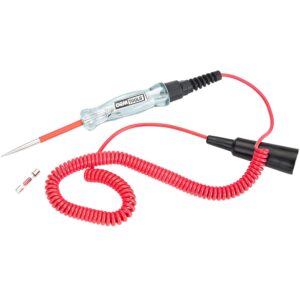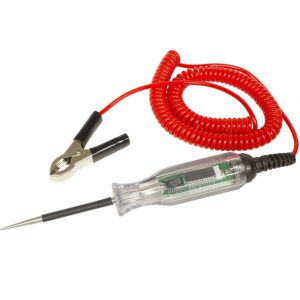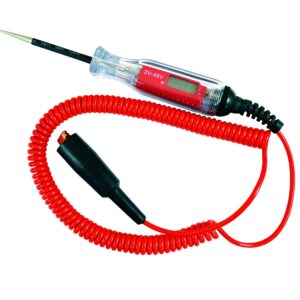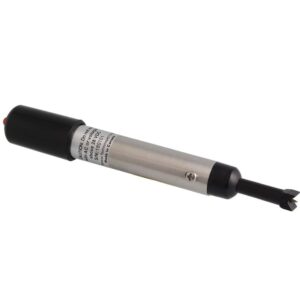




Customer’s Choice: the Best Rated Circuit Testers
[survey_answers id=”640296716″ style=”plain” data=”score”] users answered this survey. Please help us improve this review!
[survey_answers id=”640296716″ style=”piechart” legend=”true”]
How can you get rid of the electrical issues in your vehicle? What if the fuse or brakes are not working? It is reasonable to check the circuit for connection problems. A proper diagnostic tool is required.A circuit tester plugs into an electrical outlet to check the wiring. You can plug it into a car’s socket or a wall outlet to see if it is passing power. This detection tool shows a positive voltage range or an issue with your electrical connection.
After reading the review, you can choose the best circuit tester. You will see the selection of top 5 automotive circuit testers on this page. See the reviews and then read on to learn how to pick them.
IIT 26001 Professional Circuit Tester– the best for the price!
 The circuit tester would not have a light bulb. The black ground wire is soldered correctly. You can use this tool to fix things when you do it yourself. The cord should be long enough to ensure free movements.
The circuit tester would not have a light bulb. The black ground wire is soldered correctly. You can use this tool to fix things when you do it yourself. The cord should be long enough to ensure free movements.
Pros
- A professional device;
- Affordable;
- Lifetime warranty;
- Long cord;
Cons
- The launch issues;
- Instructions are not included;
It is really cheap when opposed to other testers. This circuit tester is lightweight and of high quality. It ensures a secure grip.
OEM TOOLS 25886 Circuit Tester– the best for durability!
 The OEM Tools 25886 tester comes with a long cable to encourage you to travel with this tool. It is logical to expect its cable to be heat-resistant. The tester is constructed to enable durability.
The OEM Tools 25886 tester comes with a long cable to encourage you to travel with this tool. It is logical to expect its cable to be heat-resistant. The tester is constructed to enable durability.
The device pierces through the circuit to detect electrical shorts. It weighs 6.4 ounces, making it easily portable.
Pros
- Lightweight;
- Durable;
- Insulated stainless steel probe;
- Heat-resistant cord;
Cons
- A bit flimsy and dim LED display;
- Ground clamp bends easily;
It offers quality, and it comes back to its original length after using. You do not have to struggle to get the cord stretched. Great for an RV application. The red light can be seen in direct sunlight.
Lisle 28830 Digital Circuit Tester– the best for the cord length!
 The Lisle 28830 tester is a budget yet practical pick. A coiled cord that can be stretched at will and pack quickly. On average, the cable pulls about 12 feet. It works for far-reaching objects.
The Lisle 28830 tester is a budget yet practical pick. A coiled cord that can be stretched at will and pack quickly. On average, the cable pulls about 12 feet. It works for far-reaching objects.
This digital tester comes with a wide range of voltage and current that is appropriate for most vehicle systems. It comes with an LED light indicator that makes it easy to use. Two light-emitting diodes give a 360-degree view of polarity.
It uses a dense alligator clamp and a little LED unit to replace the incandescent light bulb. This means the opposite color that indicates negative polarity.
Pros
- Decent voltage range;
- The extensive coil cord;
- 360-degree view with 2 LEDs;
- Insulated probe;
Cons
- Limited volt readings;
- Short life span;
A handy tool for anybody working on car electrical systems. By measuring the voltage of the probes it shows the exact voltage at the very tip. The indicator lights are very bright.
Astro 7764 Digital LCD Wide Range Circuit Tester – the best for versatility!
 The Astron 7756 circuit tester is only compatible with automobiles, small boats and even motorcycles in the 3-48V scale. This device can test a plane’s circuit to some extent. It does provide a user with precise voltage readings. An integrated display is necessary for diagnosing system issues.
The Astron 7756 circuit tester is only compatible with automobiles, small boats and even motorcycles in the 3-48V scale. This device can test a plane’s circuit to some extent. It does provide a user with precise voltage readings. An integrated display is necessary for diagnosing system issues.
Pros
- Bright LCD;
- Accurate readings;
- Suitable for cars, boats, motorcycles;
- Easy piercing;
- Portable;
Cons
- Pricey;
- Poor viewing angle of LCD;
- Bulb issues;
This tester is suitable for use on automobiles, RVs, boats, motorcycles, snowmobiles and airplanes. It checks electrical circuits and accessories on 3-48 volt systems.
General Technologies Corp GTC CT8002 Cordless Circuit Tester– the best for remote testing!
 The General Technologies Corp tester offers technical power cord that is safely built with no ground wire or clip and provides an extension rail for piercing and transporting. In battery-operated systems, the unit works between 3 and 28 volts DC, delivering visual (LED), auditory (sound) and tactile (vibration) input when a positive voltage is sensed.
The General Technologies Corp tester offers technical power cord that is safely built with no ground wire or clip and provides an extension rail for piercing and transporting. In battery-operated systems, the unit works between 3 and 28 volts DC, delivering visual (LED), auditory (sound) and tactile (vibration) input when a positive voltage is sensed.
Pros
- Designed for remote testing;
- Decent voltage range;
- Uses a single AA alkaline battery (included);
Cons
- Sometimes it is not accurate;
It’s a budget-friendly device that you may want to add to your toolbox whenever on the road.
The Buyer’s Guide
Voltage range
Be sure to pick the proper voltage range for a circuit tester. A number of them are running inside a 3-50V band. For new cars, 12-24V is recommended, while 6-12V can be used on older designs.
Another factor to consider when buying a test light is its energy. Make sure that the voltage tester does not show the wrong voltage.
Depending on the type of test light, 6 to 12 voltages are tested. DC provides 6V to 12V. They check from 6V to 12V (DC) and 24V (AC) circuits.
Cable/cord length
Cable duration specifically impacts the versatility of a circuit tester. A long cord allows reaching a distant circuit source. However, because of the way these cables are usually stored, it is best to invest in a coiled cable.
The length of the cord defines the versatility of the product. The range of the product can be longer than 54 inches.
Make sure you get a proper scale and enough room to test the circuits.
Digital display
The digital display is another critical aspect to consider when buying a tester for your car. The built-in multimedia display offers a fantastic experience and versatility when used.
But the prices for digital circuit testers with digital LCDs are higher. But, it’s a good feature, for sure.
While choosing a testing light, the LCD display should be an accurate one.
Safety
Make sure you use a circuit tester. It should protect you from current overload. It should come with sufficient insulation. Some models have rubber sleeves to protect the user from immediate contact with electrical contacts.
Durability
The outlet tester can represent you longer. Look for features that guarantee a long life span. Start with sturdy cords, good build quality, and a shutter-proof layout. Warranties also must be considered as proof of quality.
Price
There are various test choices open. Models vary in price, and this affects what is budgeted. On average, expect to pay $15 on a tester. The best options, however, cost around $20-$30, with a few exceptions costing at least double.
Video Tutorial: How to use a Circuit Tester to Check Car Fuse
Final thoughts
The industry provides various styles of circuit testers. Some of them only do one thing, and others bring multiple features to the table. Select carefully so you get the best quality for your money. Consider buying any electrical product with great attention to make sure it doesn’t malfunction. Because these circuits are very sensitive, it is important to consider the tests that can be done on them.




It’s a great idea to have an electrical circuit tester in the car. It can be so handy if you need to test something- for example, if your battery is empty and you’re wondering if it can still start your engine. There are many different types of testers available on the market today, but I recommend choosing one that will work with both 12 volt batteries or 6 volt batteries because cars these days often use either one.